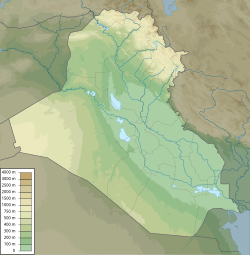Telul eth-Thalathat is an archaeological site located 40 miles (64 km) west of Mosul and just east of Tal Afar in Nineveh Province (Iraq).
| Location | Nineveh Governorate, Iraq |
|---|---|
| Region | Mesopotamia |
| Coordinates | 36°33′46″N 42°32′8″E / 36.56278°N 42.53556°E |
| Type | tell, archaeological site |
| Length | 100 metre |
| Width | 60 metre |
| Height | 7 metre |
| History | |
| Periods | Neolithic, Ubaid period, Uruk period |
| Site notes | |
| Excavation dates | 1956; 1964; 1957; 1976 |
| Archaeologists | N. Egami, S. Fukai |
Archaeology
editThe site consists of at least five separate tells or settlement mounds. Telul eth-Thalathat was excavated for four seasons between 1956 and 1965 and again in 1976 by a team from the University of Tokyo Iraq-Iran Archaeological Expedition. The main focus was to establish a complete Ninevite 5 sequence at Tell V. The first two seasons, in 1956 and 1957, were led by N. Egami and worked at Tell II. Burials, residential areas, and a presumed temple were uncovered.[1][2] The final season was led by S. Fukai.[3][4][5] Among the small finds was a small square stamp seal with two human figures dated to the late 4th or early 5th millennium BC.[6]
Occupation history
editTelul eth-Thalathat was occupied in the Ubaid, Nineveh 5, and Uruk periods, as well as during Middle Assyrian times. Excavations have revealed over 20 kilns and a number of burials, as well as some figurines and spindle whorls.[7] Eleven Neolithic clay tokens were also recovered.[8] On Tell V a single period Ninevite 5 settlement was found. It included a 6 by 18 meter building interpreted as a granary.[9] Tell II showed occupation from the Pottery Neolithic to Middle Uruk periods.[10]
See also
editReferences
edit- ^ [1] Egami, Namio, "The Preliminary Report of the Excavations at Telul ath-Thalathat (1956)", Sumer, vol. 13, pp. 5-11, 1957
- ^ N. Egami, Telul eth-Thalathat, "Vol. I, The Excavations of Tell II, 1956-1957", The Institute of Oriental Culture, The University of Tokyo, Yamakawa Pub. Co, 1958
- ^ S. Fukai, K. Horiuchi and T. Matsutani, "Telul eth-Thalathat, Vol. II, The Excavations of Tell II, The Third Season (1964)", The Institute of Oriental Culture, The University of Tokyo, Yamakawa Pub. Co, 1970
- ^ S. Fukai, K. Horiuchi and T. Matsutani, "Telul eth-Thalathat, Vol. III, The Excavations of Tell V, The Fourth Season (1965)", The Institute of Oriental Culture, The University of Tokyo, Yamakawa Pub. Co, 1974
- ^ S. Fukai, T. Matsutani, "Telul Eth-Thalathat, Vol. IV The Excavation of Tell II, the Fifth Season (1976)", Institute of Oriental Culture, University of Tokyo, Yamakawa Pub. Co, 1981
- ^ Garfinkel, Yosef, "chapter 12 Later Examples from the Near East", Dancing at the Dawn of Agriculture, New York, USA: University of Texas Press, pp. 269-290, 2003
- ^ [2] Robert A. Carter and Graham Philip, "Beyond the Ubaid: Transformation and integration in the late prehistoric societies of the Middle East", Studies in Ancient Oriental Civilization 63, Oriental Institute of the University of Chicago, 2010, ISBN 978-1-885923-66-0
- ^ Overmann, Karenleigh A., "Chapter 9. The Neolithic Clay Tokens", The Material Origin of Numbers: Insights from the Archaeology of the Ancient Near East, Piscataway, NJ, USA: Gorgias Press, pp. 157-178, 2019
- ^ Roaf, Michael, and Robert Killick, "A Mysterious Affair of Styles: The Ninevite 5 Pottery of Northern Mesopotamia", Iraq, vol. 49, pp. 199–230, 1987
- ^ Sudo, Hiroshi, "The development of wool exploitation in Ubaid-period settlements of North Mesopotamia", Beyond the Ubaid: Transformation and integration in the late prehistoric societies of the Middle East. SAOC 63, pp. 169-179, 2010
Further reading
edit- [3] Fukai, S. and T. Matsutani, Excavations at Telul eth-Thalathat, 1976, Sumer, vol. 33, no. 1: pp. 48–64, 1977
- Nishiaki, Yoshihiro., and H. I. H. Prince Takahito Mikasa, "Reexamination of neolithic stone artifacts from Telul eth-Thalathat, northern Iraq", Essays on Ancient Anatolia and its Surrounding Civilizations. Harassowitz, Tübingen, pp. 153–172, 1995
- Uwe Sievertsen, "Frühe Pfeiler-Nischen-Architektur Aus Tepe Gawra Und Telul Eth-Thalathat", Iraq, vol. 67, no. 1, pp. 399–409, 2005

